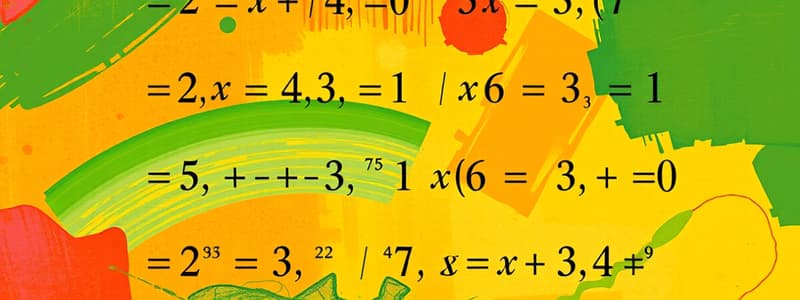Podcast
Questions and Answers
What does 'absolute value' represent?
What does 'absolute value' represent?
- A mathematical sentence expressing the relationship between quantities
- An expression which contains at least one variable
- Two separate inequalities graphed on the same coordinate plane
- The number of units between a number and zero (correct)
What is an algebraic expression?
What is an algebraic expression?
An expression which contains at least one variable
Define compound inequality.
Define compound inequality.
Two separate inequalities which are graphed on the same coordinate plane.
What is an empty set?
What is an empty set?
Provide an example of an equation.
Provide an example of an equation.
Define a formula.
Define a formula.
What are integers?
What are integers?
The graph of a compound inequality containing the word 'and' can be called the ________ of the graphs of the two separate inequalities.
The graph of a compound inequality containing the word 'and' can be called the ________ of the graphs of the two separate inequalities.
What are irrational numbers?
What are irrational numbers?
Define natural numbers.
Define natural numbers.
What is an open sentence?
What is an open sentence?
What is the order of operations?
What is the order of operations?
What are rational numbers?
What are rational numbers?
What are real numbers?
What are real numbers?
Define set-builder notation.
Define set-builder notation.
What is the solution in mathematical terms?
What is the solution in mathematical terms?
What does 'union' refer to in compound inequalities?
What does 'union' refer to in compound inequalities?
What is a variable in mathematics?
What is a variable in mathematics?
Define whole numbers.
Define whole numbers.
Flashcards are hidden until you start studying
Study Notes
Equations and Inequalities Vocabulary
-
Absolute Value: Refers to the distance of a number from zero on the number line, denoted as |x|.
-
Algebraic Expressions: These expressions include variables, constants, and arithmetic operations, forming mathematical phrases like 2x + 3.
-
Compound Inequality: Involves two separate inequalities combined, often linked by 'and' or 'or', graphed together on a coordinate plane.
-
Empty Set: The solution set for an equation with no real solutions, often represented by the symbol ∅ or {}.
-
Equation: A mathematical statement asserting the equality of two expressions, such as -5x² = -125.
-
Formula: A concise way to express the relationship between variables, like A = πr² for the area of a circle.
-
Integers: Consist of whole numbers that can be positive, negative, or zero without fractional or decimal parts.
-
Intersection: The overlap of graphs in a compound inequality expressed with 'and', representing common solutions.
-
Irrational Numbers: Include numbers that cannot be expressed as fractions or ratios, like π and √2, extending infinitely without repeating.
-
Natural Numbers: The set of positive counting numbers starting from 1 and does not include zero.
-
Open Sentence: A mathematical sentence involving variables, leaving room for solutions (e.g., x + 3 = 5).
-
Order of Operations: The specific rules that dictate the sequence in which operations should be performed in expressions, often remembered by the acronym PEMDAS (Parentheses, Exponents, Multiplication and Division, Addition and Subtraction).
-
Rational Numbers: Numbers expressible as a fraction a/b, where a and b are integers and b ≠ 0, encompassing whole numbers and terminating or repeating decimals.
-
Real Numbers: The complete set of rational and irrational numbers, each corresponding to a point on the number line.
-
Set-Builder Notation: A shorthand for describing a set by stating the properties that its members must satisfy, commonly used for inequalities.
-
Solution: A specific value or set of values that satisfy an equation or inequality, making it true.
-
Union: The combination of two sets or graphs from a compound inequality connected with 'or', including all solutions from both inequalities.
-
Variable: Typically represented by letters, these symbols denote unknown quantities in equations and expressions, such as x, y, or z.
-
Whole Numbers: Comprise the set of natural numbers plus zero, including {0, 1, 2, 3,...}.
Studying That Suits You
Use AI to generate personalized quizzes and flashcards to suit your learning preferences.




